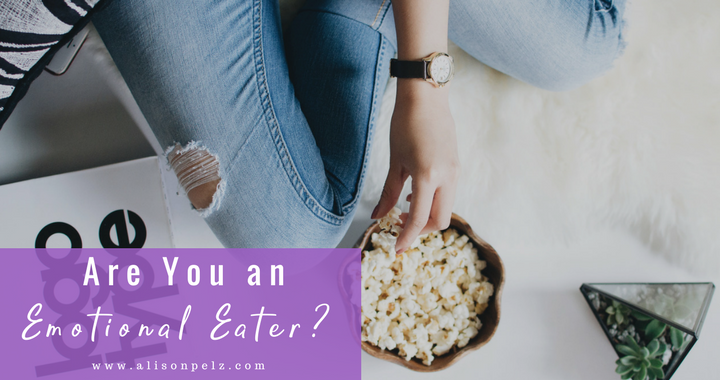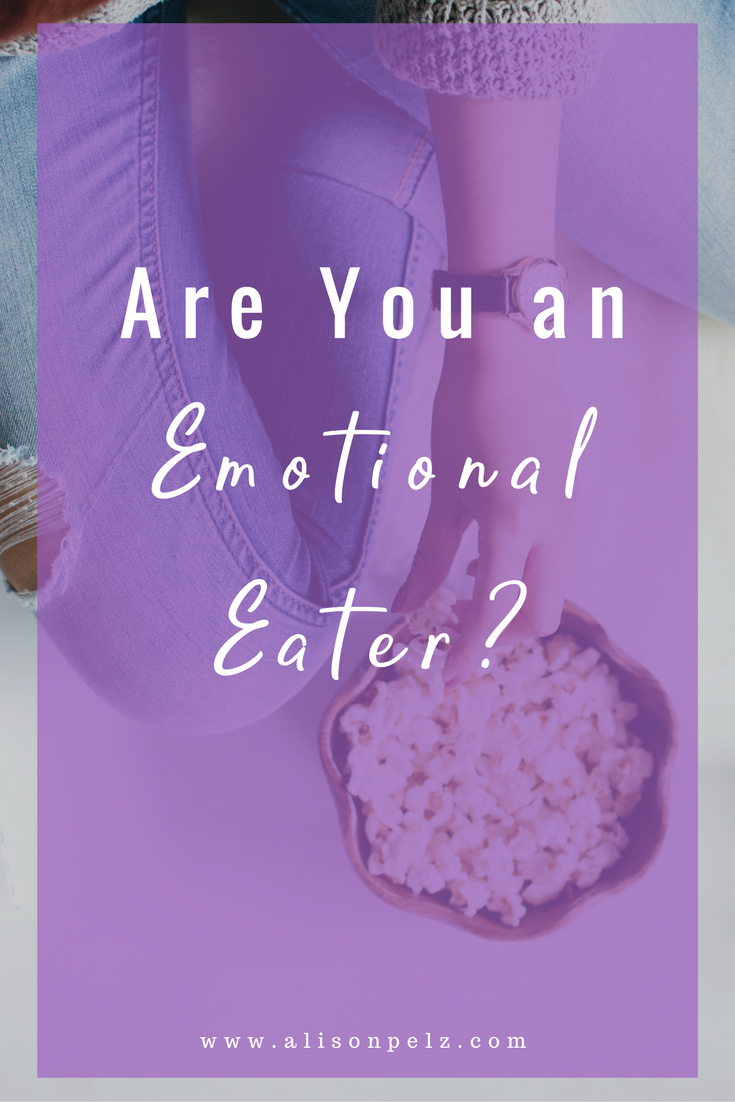We are emotional beings.
As we go through our day we experience a wide range of emotions. We feel sadness, excitement, fear, anger, happiness, and the list goes on. That’s normal. We experience emotion while we are going about our daily lives: at work, talking with friends, relaxing and of course while eating.
So, it is normal to experience some emotions while you eat. You may have an emotional response to the meal, to the food itself, or to something else that is going on in your day.
Does this make you an “emotional eater?”
No.
Simply put, emotional eating is habitually eating in response to emotions (all kinds whether they’re happy feelings or distressing feelings) when not physically hungry.
You may be familiar with other habits people use to cope with uncomfortable feelings. These may include excessive spending of money or playing excessive amounts of video games, for example.
Thinking about, buying & preparing food, and eating food to cope with usually uncomfortable feelings is really the hallmark of emotional eating.
Emotional eating can be hard to figure out because we need food to survive! Furthermore, some health conditions and medications can cause an increase in appetite. Increased or decreased appetite is a symptom of depression.
Anyone who lives in Western society, unfortunately, is very familiar with all the mixed food messages we get in the media (for example, foods that we should and shouldn’t eat), which complicates it even further.
Emotional eating has nothing to do with being weak, unmotivated, or not having willpower. Some of my clients are incredibly successful and determined folks. I know this may sound backward, but people who rely on food to get through stress are able to be successful because of their emotional eating.
How do I know if I am an emotional eater?
- “Emotional eater” is not a diagnosis per se. But, it can be a part of an eating disorder. If you think that you have an eating disorder, please seek treatment immediately.
- It is normal to eat when experiencing emotions because we are emotional beings.
- Remember, emotional eating is eating in response to feelings that you think you can’t handle, so you turn to food to help you feel better.
- Emotional eating usually makes you feel good in the short-term but worse in the long-term.
- Emotional eating is problematic if it is one of the few (or only) coping skills that make you feel better.
- Emotional eating becomes problematic if it is pervasive and negatively affects your life. This includes your physical health, social life & relationships, and/or career or academics.
Some tips to reduce eating in response to emotions:
Often people try to diet or follow some sort of a meal plan to make the emotional eating go away.
This almost always backfires.
Remember, the food is used to cope with feelings, so the feelings need to be addressed, not the food itself.
- Notice your feelings. Right now, go ahead and try to identify a feeling that you may be having. Are you experiencing feelings of worry, hopefulness, anger, or contentment?
- As you go through your day, notice the ebb and flow of feelings. Feelings come and go throughout out the day.
- Oftentimes, there is a body sensation connected to a feeling. For example, when you feel worried, you may feel it in your stomach.
- Try not to judge your feelings. Often we deem our feelings to be either “good” or “bad”. Happiness, contentment, joy, and hope are often labeled as “good” emotions. Fear, anger, and jealousy are often identified as “bad” emotions. When we judge our feelings, we tend to focus on eliminating the negative and pursuing the positive.
“Negative” feelings are a normal part of life. Once we learn to accept this and tolerate them we don’t have to use food to cope.
- Now that you have named your feelings, you may be able to identify how it feels in your body. There are several ways to cope with intense feelings instead of using food.
Sit with your feelings. Try to accept that you are having an intense emotion and notice that it will pass.
If this feels too uncomfortable try these methods:
Distraction; which includes thinking or doing something else to not think about feelings. Distraction can include reading a book, listening to music or a podcast, watching TV, going out with or calling a friend or family member, or hobbies, to name a few. When choosing a method of distraction, consider using a method that is not harmful (such as excessive drinking, spending, etc.).
Work through your feelings by talking to a friend or family member, writing in a journal, or listening to music that may mirror the feelings you are feeling.
If you are reading this, then most likely you have been using food to cope with life for quite awhile. Often this habit is developed in childhood. So, be patient with yourself. It is going to take a lot of practice to cope with emotions without using food.
This article is for informational purposes only. It does not replace mental health or medical treatment if needed.


